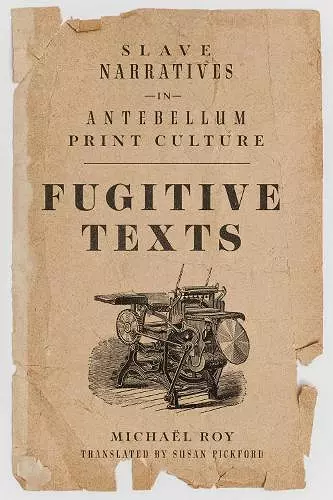Fugitive Texts
Slave Narratives in Antebellum Print Culture
Michael Roy author Susan Pickford translator
Format:Paperback
Publisher:University of Wisconsin Press
Published:31st Mar '24
Should be back in stock very soon

Antebellum slave narratives have taken pride of place in the American literary canon. Once ignored, disparaged, or simply forgotten, the autobiographical narratives of Frederick Douglass, Harriet Jacobs, and other formerly enslaved men and women are now widely read and studied. One key aspect of the genre, however, has been left unexamined: its materiality. What did original editions of slave narratives look like? How were these books circulated? Who read them?
In Fugitive Texts, MichaËl Roy offers the first book-length study of the slave narrative as a material artifact. Drawing on a wide range of sources, he reconstructs the publication histories of a number of famous and lesser-known narratives, placing them against the changing backdrop of antebellum print culture. Slave narratives, he shows, were produced through a variety of print networks. Remarkably few were published under the full control of white-led antislavery societies; most were self-published and distributed by the authors, while some were issued by commercial publishers who hoped to capitalize on the success of Harriet Beecher Stowe’s Uncle Tom’s Cabin. The material lives of these texts, Roy argues, did not end within the pages. Antebellum slave narratives were “fugitive texts” apt to be embodied in various written, oral, and visual forms.
Published to rave reviews in French, Fugitive Texts illuminates the heterogeneous nature of a genre often described in monolithic terms and ultimately paves the way for a redefinition of the literary form we have come to recognize as “the slave narrative.”
“This evocative study throws into stark relief the material conditions of authors who not only produced texts but also shepherded them through print infrastructures and into the hands of readers. Making contributions to African American literary history, book history, and print culture studies, Fugitive Texts encourages continued conversations about the material conditions of this literary history.”—Brigitte Fielder, author of Relative Races: Genealogies of Interracial Kinship in Nineteenth-Century America
Praise for the French edition:
“Offers a new approach to slave narratives.”—Études littÉraires africaines
“The historical sweep MichaËl Roy carries out here allows him to advance strong conclusions.”—Lectures
“Rethinking the place of slave narratives in the literary and political fields of the antebellum United States, revisiting presuppositions: these are the points which allow this rigorous, vigorous, and very well-written work to stand out from other analyses of these texts.”—Textes & Contexte
“Gives slave narratives a renewed breath of life. . . . Fugitive Texts significantly contributes to studies on slavery, abolition, gender, print culture, the antebellum era, and African American studies. . . . Treating narratives as an artifact to unveil new layers of how the formerly enslaved asserted themselves and made their voices ‘heard’ broadens our understanding of the antebellum period. It allows us to grasp how people came to form meanings for these printed volumes.”—H-Net Reviews
ISBN: 9780299338442
Dimensions: 229mm x 152mm x 18mm
Weight: 272g
234 pages